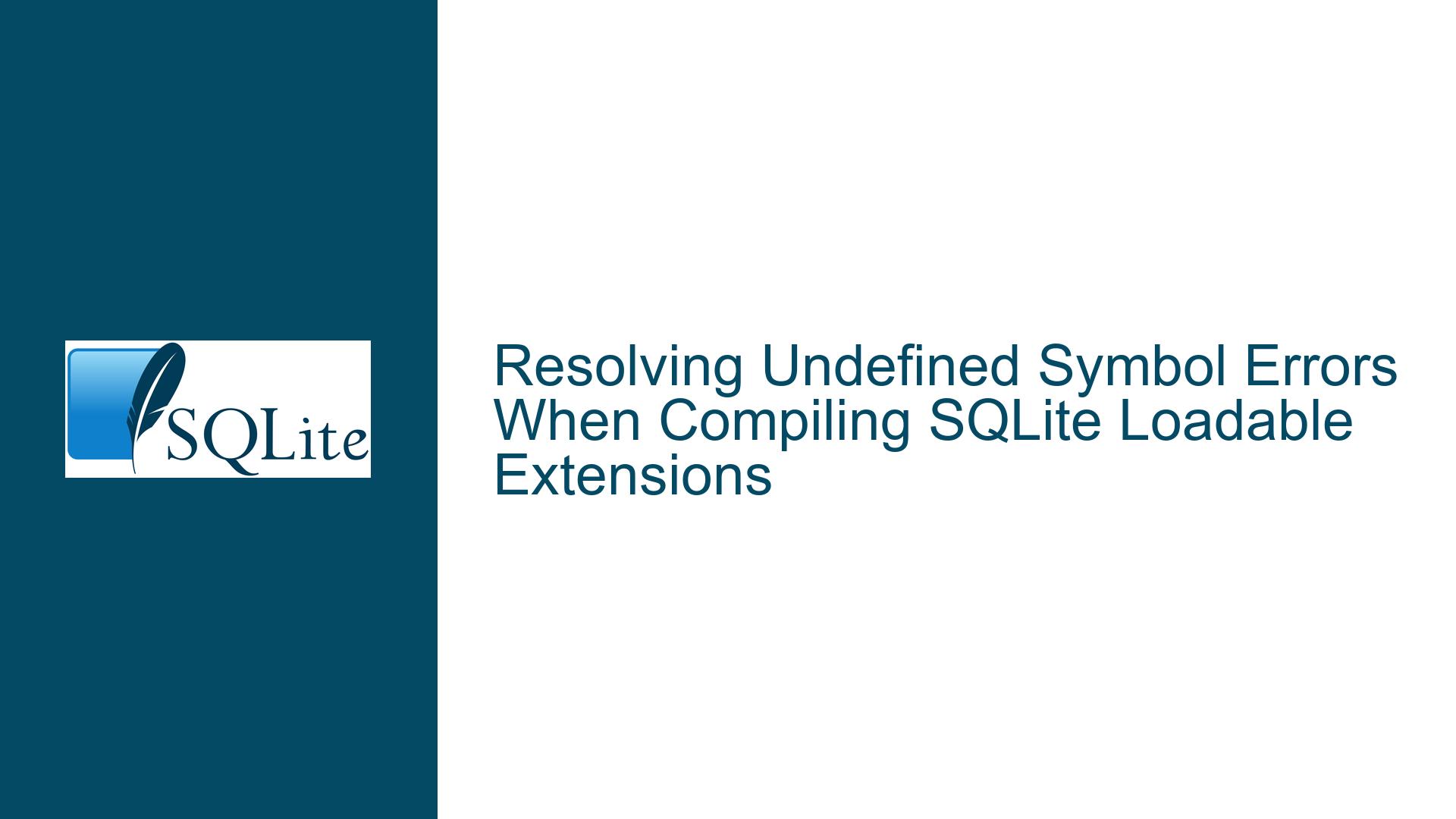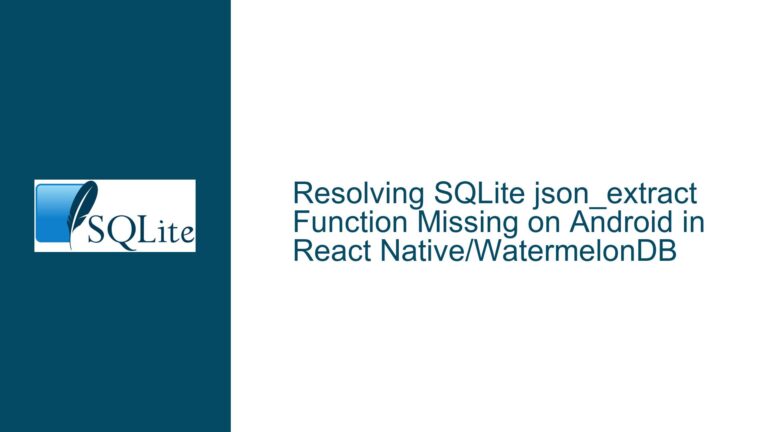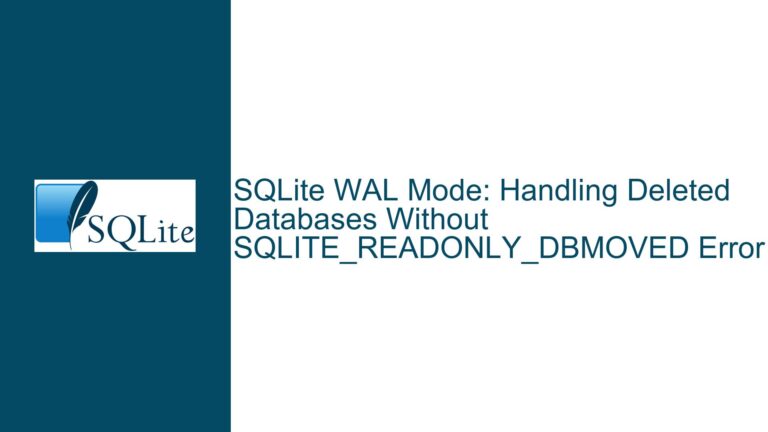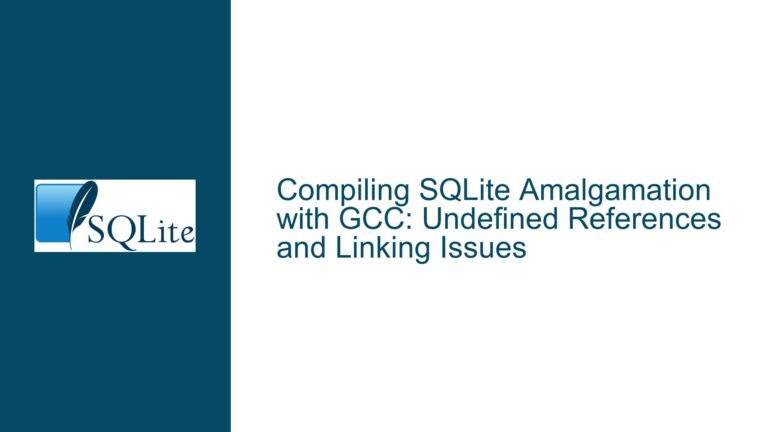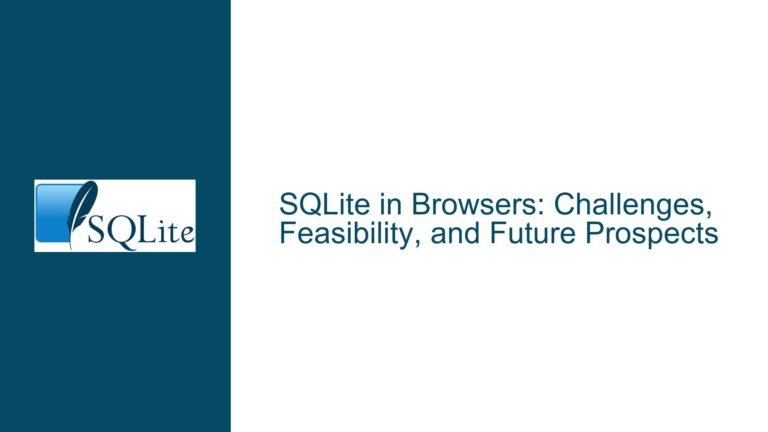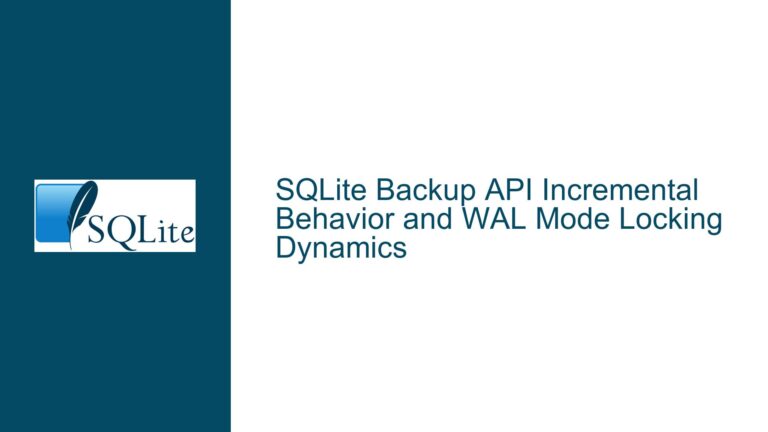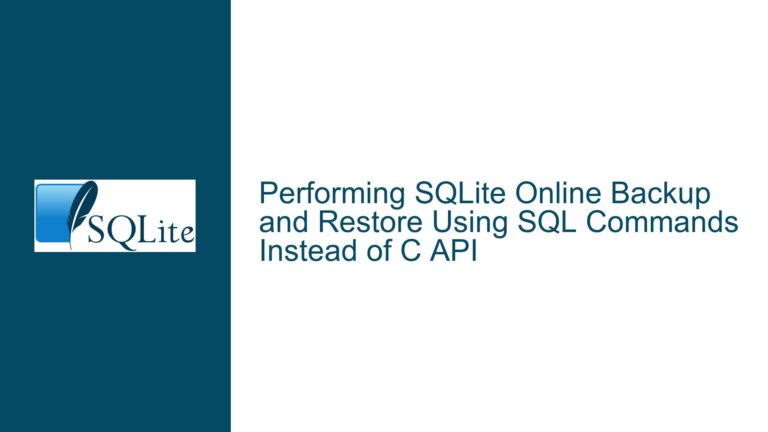Resolving Undefined Symbol Errors When Compiling SQLite Loadable Extensions
Undefined Symbol "arrayscalar_init" During SQLite Extension Compilation: Comprehensive Analysis and Solutions
Issue Overview: Missing Symbol in Dynamically Loaded SQLite Extension
When compiling a SQLite loadable extension, encountering an "Undefined symbol" error during runtime loading indicates that the linker could not resolve one or more function or variable references required by the extension. In the case of the array extension from the Sqlean project, the error Undefined symbol "arrayscalar_init" points to a failure in including the source file where this symbol is defined during the compilation and linking process.
SQLite extensions are typically compiled as shared libraries (.so on Unix-like systems, .dll on Windows). These libraries must contain all necessary symbols (functions, variables) referenced by the extension’s entry points. The arrayscalar_init function is part of the array extension’s codebase, specifically defined in src/array/scalar.c. When compiling the extension, omitting this file from the build command results in a shared library that lacks the symbol, leading to the runtime error.
The error manifests on FreeBSD but not Windows due to differences in how operating systems handle dynamic linking. Windows (via MinGW or MSVC) may implicitly include certain symbols or optimize unused code differently, whereas FreeBSD’s linker adheres strictly to symbol resolution rules, exposing missing dependencies immediately.
Possible Causes: Incomplete Source Inclusion and Build Misconfiguration
1. Incorrect Compilation Command Structure
The most common cause of undefined symbols when compiling SQLite extensions is an incomplete list of source files in the compilation command. The array extension consists of multiple source files (e.g., array.c, scalar.c), each contributing essential symbols. Omitting any of these files during compilation results in a shared library missing critical components.
In the initial command provided:
cc -fPIC -shared -I./array/*.c array.c -o array.so
the -I./array/*.c flag is misused. The -I compiler flag specifies directories to search for header files, not source files. The wildcard *.c in this context is interpreted as a directory name, leading to incorrect header resolution and excluding scalar.c from the build.
2. Misunderstanding Build Systems and Makefile Logic
The Sqlean project’s Makefile uses a structured approach to compile extensions. For example:
make compile-linux-extension name=array src="src/array/*.c"
This command explicitly includes all source files under src/array/ (including scalar.c) when building the extension. Developers attempting manual compilation without replicating this logic risk excluding necessary files, especially when the project’s source structure spans multiple directories.
3. Platform-Specific Linking Behavior
Dynamic linking behavior varies across platforms. Windows’ linker (e.g., via MinGW) may tolerate unresolved symbols if they are not immediately referenced, whereas Unix-like systems (FreeBSD, Linux) enforce strict symbol resolution at load time. This discrepancy explains why the same compilation command might work on Windows but fail on FreeBSD.
Troubleshooting Steps, Solutions & Fixes
Step 1: Validate Source File Inclusion
Problem Identification
Ensure all source files required by the extension are included in the compilation command. For the array extension, this includes:
array.c(main extension entry point)src/array/scalar.c(definesarrayscalar_init)- Other files in
src/array/(e.g.,vector.c, if present)
Solution
Modify the compilation command to explicitly include all relevant source files:
cc -fPIC -shared -I./array array.c ./array/scalar.c -o array.so
Here, -I./array correctly adds the array directory to the header search path, while ./array/scalar.c ensures the missing symbol’s source is compiled into the shared library.
Wildcard Handling
On Unix-like systems, shell expansion can simplify including multiple sources:
cc -fPIC -shared -I./array array.c ./array/*.c -o array.so
This command compiles all .c files in the array directory, guaranteeing that all symbols are included.
Step 2: Replicate Project Build System Logic
Analyzing the Makefile
The Sqlean project’s Makefile targets (e.g., compile-linux-extension) abstract away platform-specific compilation details. For the array extension, the command:
gcc -fPIC -shared -Isrc src/array.c src/array/*.c -o dist/array.so
reveals critical details:
-Isrc: Includes thesrcdirectory for headers.- Explicit inclusion of
src/array.candsrc/array/*.cas source files.
Manual Compilation Alignment
Replicate this structure when compiling manually:
cc -fPIC -shared -Isrc src/array.c src/array/*.c -o array.so
Adjust paths according to the project’s directory structure.
Step 3: Diagnose Symbol Inclusion with Linker Tools
Using nm to Inspect Symbols
The nm utility lists symbols in object files or shared libraries. To verify whether arrayscalar_init is present:
nm -gC array.so | grep arrayscalar_init
If the symbol is missing, the output will be empty.
Using ldd and readelf for Dependency Checks
On FreeBSD and Linux, ldd displays shared library dependencies, while readelf (Linux) or elfdump (FreeBSD) provides detailed symbol tables:
elfdump --syms array.so | grep arrayscalar_init
Addressing Missing Symbols
If the symbol is absent:
- Confirm its source file (
scalar.c) is included in the build. - Ensure no typos or macro guards exclude the symbol’s definition.
- Verify compiler optimizations (e.g.,
-O2) do not strip the symbol.
Step 4: Resolve Header Inclusion and Macro Conflicts
Header File Structure
SQLite extensions often rely on headers from both SQLite (sqlite3ext.h, sqlite3.h) and the project’s internal directories. Misconfigured include paths can lead to missing declarations or macro redefinitions.
Correct Include Flag Usage
Specify header directories with -I, not individual files:
cc -fPIC -shared -I./ -I./array array.c ./array/*.c -o array.so
Preprocessor Definitions
Some extensions require macros like SQLITE_CORE or SQLITE_AMALGAMATION to be defined. For example:
cc -fPIC -shared -DSQLITE_CORE -I./array array.c ./array/*.c -o array.so
Step 5: Address Platform-Specific Linking Nuances
FreeBSD vs. Windows Linking
FreeBSD uses the ELF format for shared libraries, requiring explicit symbol resolution at load time. Windows’ PE format allows lazy symbol resolution, which can mask missing symbols until they are called.
Linker Flags for Symbol Visibility
Use -Wl,--export-dynamic (GCC) or -export-dynamic (Clang) to ensure all symbols are exported:
cc -fPIC -shared -Wl,--export-dynamic -I./array array.c ./array/*.c -o array.so
Static vs. Dynamic Linking
If the extension depends on external libraries (uncommon for SQLite extensions), ensure they are linked dynamically:
cc -fPIC -shared -I./array array.c ./array/*.c -lsome_library -o array.so
Step 6: Debugging Common Build Tool Pitfalls
Wildcard Expansion in Shells
Incorrect wildcard usage can exclude files. Test wildcard expansion with echo:
echo ./array/*.c
Verify all expected source files are listed.
Makefile Variable Substitution
When adapting Makefile logic manually, ensure variables like $(src) expand correctly. The original Makefile line:
gcc -fPIC -shared -Isrc src/$(name).c $(src) -o dist/$(name).so
translates to src/array.c src/array/*.c when name=array and src="src/array/*.c".
Out-of-Source Builds
Building from a directory outside the source tree requires adjusting include and source paths:
cc -fPIC -shared -I../sqlean/src ../sqlean/src/array.c ../sqlean/src/array/*.c -o array.so
Step 7: Rebuilding SQLite Amalgamation with Extension Support
When to Rebuild SQLite
If the extension relies on SQLite internals (e.g., virtual tables), it may require compiling against the SQLite amalgamation with extensions enabled.
Steps
- Download the amalgamation:
wget https://sqlite.org/2022/sqlite-amalgamation-3390300.zip unzip sqlite-amalgamation-3390300.zip - Compile SQLite with extension support:
cc -DSQLITE_CORE -c sqlite3.c - Compile the extension with the amalgamation:
cc -fPIC -shared -I. -I./array array.c ./array/*.c sqlite3.o -o array.so
Step 8: Validating the Loaded Extension
Testing in SQLite Shell
After compiling, load the extension interactively:
.load ./array
If successful, extension functions (e.g., array_length()) will be available.
Enabling Diagnostic Output
Set SQLite’s diagnostic mode to verbose:
PRAGMA verbose=ON;
.load ./array
This may reveal additional loading errors.
Final Recommendations
- Adopt Project Build Systems
Prefer using the project’s Makefile or build scripts to avoid manual errors. - Audit Source Dependencies
Map all symbols to their source files before compiling. - Leverage Platform-Specific Tools
Usenm,elfdump, orobjdumpto validate symbol inclusion. - Test Across Platforms
Validate extensions on all target platforms early in development.
By methodically addressing source inclusion, build configuration, and platform nuances, developers can resolve undefined symbol errors and ensure robust SQLite extension deployment.
